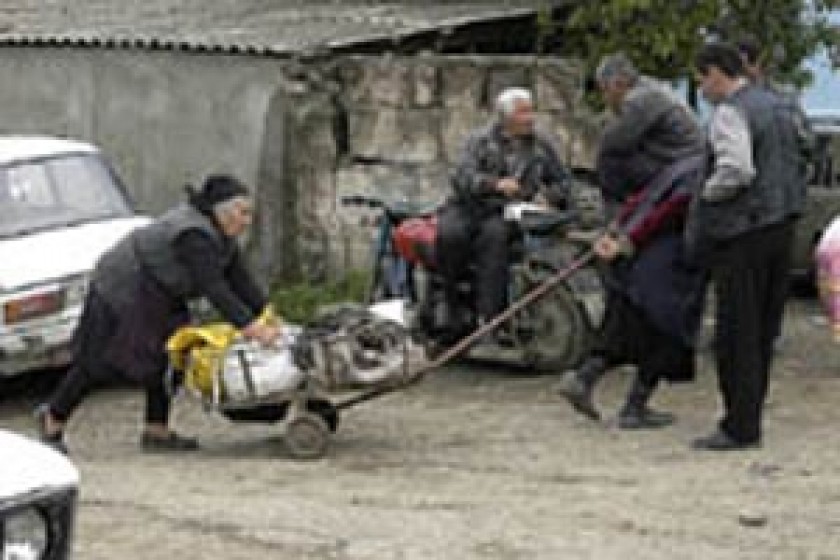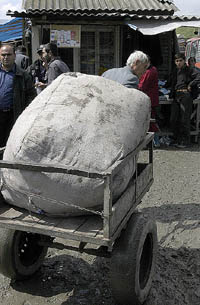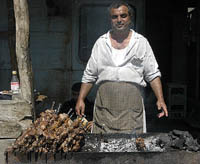
One day on the Armenian-Georgian border
The Sadakhlo bazaar is just over the Georgian border. The gates on the Armenian side wouldn't open until 8 a.m., but the parking lots in the Armenian village of Bagratashen were already full the night before. The first rumblings of trucks and buses with Armenian license plates could be heard at 1 a.m., and the shashlik-houses and trade outlets on either side of the border were open for business. Several hours before the border gate opened, passports were being checked at the first entrance to the territory. There were people who didn't have passports or exit permits, in violation of the border regime, but they had no problem sorting this out with a payment of 500 drams (less than a dollar). At 7:20 a.m., some 500 people were waiting for the border guards near the gate on the border bridge. The flow of buses and cars continued, coming from all the regions of Armenia, and from Nagorno Karabakh as well.
At 8 a.m. the gates opened. People went to find their own trusted traders, confident that they'd get the best goods-they had set up the deals with Saddam, Latif, Khanlar, Kiaram, and other Azerbaijani partners the previous Tuesday. Passport control was impossible, and the Armenian and Georgian border guards didn't liven up until the traders began to come back. We were impressed by their memory. Between 2,000 and 3,000 people cross the border on Tuesdays alone. It turned out that the border guards know almost every one by sight. They asked for passports only from people who had come to Bagratashen for the first time. After our passports were checked on the Armenian side, a Georgian border guard approached us and said coolly that our passports were missing the pages with Russian translation, and that we had to pay a fine. We asked whether he would give us a receipt. The border guard was surprised at first, and then when he found out that we were journalists, said he would do us a favor and let us cross.
Some thirty minutes after the gate opened, the first trucks and loading carts appeared on either side of the border. No one was in a rush-the main activity doesn't begin until after 10 a.m. They lined up the carts along the walls and waited. Each of them has his own clients he's been working with for five or ten years, sometimes even longer. Only the working methods of the loaders have changed. If in the past they had to go back and forth several times carrying the goods on their backs, now they use carts, and can transport up to a ton of goods at a time.
Artsrun, a loader from Alaverdi is pleased with his job. Although he has about 300 competitors, he has plenty of clients. "I bought my cart for $70. I rent a room in Bagratashen for 200 drams a day," Artsrun says. The other days of the week he spends with his family. He says that the border guards know the loaders and don't ask for passports at the checkpoints. "It's hard to keep the documents with you. We work in the rain and under the sun, we sweat, get wet, how can we keep them? They'd be useless in a couple of days." The loaders are not responsible for what they transport over the border; they just make money for carrying it, between 200 and 500 drams a sack, depending on the size. But Artsrun has colleagues who make no more than 1,000 drams a day. Artsrun says that the loaders are mostly from Alaverdi and Noyemberian. "The money is mainly in Yerevan today. How can someone from Alaverdi make money?"
But the loaders in Bagratashen seem to be the only ones who are happy with the way things are run here. One woman told us angrily, "This is the first time I've been here, and I'm never coming back again. What's going on here? Who am I supposed to pay?" Still shouting, she headed for the parking lot.
We stood near the customs office for some twenty minutes, observing what was going on. Many people simply obeyed the unwritten law of Bagratashen, quietly paying 500 drams and going away without any official registration. Most avoided our questions. We managed to convince one woman we were harmless, and she told us she had paid 150 drams to a custom officer. "Otherwise they would bore me to death," she explained.
 |
 |
 |
At noon, when things had calmed down a little, we spoke to residents of Bagratashen and drivers from various regions of Armenia, out of sight of the border guards, policemen, national security officers, bazaar managers, and other "overseers". They told us the story from the very beginning-how back in1991 the first people from Bagratashen came to the border with agricultural produce for sale. The villagers would buy and sell, then people started to come from the surrounding villages, from the Azeri-populated villages of Georgia, too, and the trading expanded. During the Karabakh war, the border bridge was blown up several times and trading stopped. This was especially damaging for the Armenians, who were under a blockade by Azerbaijan.
In the mid-1990's. Bagratashen and Sadakhlo became a border trade zone. The traffic expanded, particularly in 1997-1998. In those years, in spite of resistance from the traders, the control over the bazaar became tougher, walls were erected, and checkpoints were opened.
People come to Bagratashen from all corners of Armenia to buy mainly food and clothes. Tamara, from the village of Daral in Spitak brings galoshes, hoes and rakes to re-sell. "If you have a couple of drams you come to Bagratashen. There is no other way to make money in this country if you don't have enough to start a business. Let's say a relative of mine sent me $100 from abroad, what can I do with it in the city? So we bring it here."
"One guy has to take care of a sick relative, another has to pay for his children's studies, another just has to make money," says Vanik, a driver from Artashat. "There are some people who come with $800-$1,000, but they come at night, and our paths don't cross. They drive their trucks filled with goods to Georgia, to Sadakhlo," one of the drivers said, refusing to give us his name, since, "there are a thousand ways to hurt me."
Suren Barsegian is another man from Bagratashen who provides for his family thanks to the bazaar. He turned the land next to his house into a parking lot. He charges 1,000 drams per bus, and 500 drams per passenger car. He put Ashot "the Brawny" in charge of the toilet, and he charges 50 drams per user.
"It's all legal. We pay taxes. They come from the tax department every week and measure my territory," Barsegyan said. Then he told us about all the problems facing the traders. They don't know which goods are considered smuggled, what the customs duties are for certain products, and what is legal and what is illegal in this bazaar. There is no information posted anywhere in the bazaar. Nothing is done to keep people informed. They don't know how much they are required to pay, or what for.
"They charge 32% of the product price as a customs duty. That's why more and more goods are being smuggled," the people we spoke to complained.
There are problems with acquiring a trading spot as well. On the Georgian side, the rent for a booth is 3 laris (about $1.5) a day; on the Armenian side it's $10-15 a day. And not everyone can get a spot. In order to bring goods home from Sadakhlo, traders pay six times within the bazaar itself, then they pay officers from the department that deals with the fight against smuggling, not to mention illegal payments to the traffic police. "The longer the road, the more times you have to make 200 or 500 dram payments to traffic police," the drivers say. For example, people who drive to Artik pay ten or twelve times. Spitak residents "get lucky" with just seven. "We don't even talk anymore. We know our job, they know theirs. We fold 100 dram bills up, and pass them through the window to the police."
Kyaram Mirzoyev, a resident of Sadakhlo, joined in the conversation. He brings goods from Baku. On Tuesdays and Wednesdays 100-120 trucks come here from Azerbaijan. People from Sadakhlo also go to Azerbaijan for goods to sell at the bazaar. But they pay just once at the Azerbaijani customs checkpoint-some $10-15 for $300 worth of goods. "We don't pay the traffic police," Mirzoyev says. The day after our visit, Armen Malkhasyan, the director of the Bagratashen bazaar, was relieved of his duties and transferred to a similar job in the Shirak Marz. His colleagues say that the Shirak Marz is a kind of a penal battalion for officials from Bagratashen.
Within the framework of his anti-corruption campaign, President Mikhail Sahakashvili of Georgia fired the Georgian director of the Sadakhlo bazaar. A large amount of gold and money was confiscated from his house. But Armenian traders don't believe that anything will change in this frontier corner of Armenia.
Nevertheless, this territory has one big thing in its favor - there is no conflict here for the residents of the three South Caucasian republics. Armenians and Azerbaijanis are very nice to each other. A surprised Azerbaijani man approached photojournalist German Avagyan and asked in Russian: "Why are you taking pictures?"
"I'm doing it for the war to be over soon."
"You're doing good work then," the Azerbaijani said.
Photos by German Avagyan
 Videos
Videos Photos
Photos




Write a comment